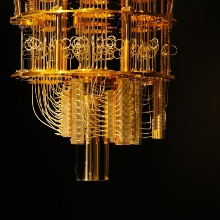On June 15, 2021, Europe's most powerful quantum computer to date was given the green light in Ehningen/District of Böblingen, in the (in some cases virtual) presence of Dr. Angela Merkel, the Federal Minister of Research Anja Karliczek, Baden-Württemberg’s Minister President Winfried Kretschmann and Baden-Württemberg's Minister of Science Nicole Hoffmeister-Kraut. The computer is part of the competence center »Quantum Computing Baden Württemberg«, in which the University of Stuttgart is also involved with several projects.
The aim of the national competence network, established by the Fraunhofer Society and in cooperation with IBM Deutschland, is to develop quantum-based computing strategies for the next generation of high-performance computers. In this context, Baden-Württemberg will become the home of the first IBM quantum computer in Germany, in order to utilize the existing high-tech landscape comprising big industry, medium-sized enterprises, SMEs and start-ups for the application-oriented operation of this high-performance computer.
Within the competence center Quantum Computing Baden-Württemberg, the Ministry of Economic Affairs, Labor and Tourism will initially fund six projects, which researchers from the University of Stuttgart are extensively involved in:
- In the project QORA (Quantum Optimization using Resilient Algorithms), Prof. Stefanie Barz (FMQ) examines error mechanisms occurring in quantum computer hardware; Prof. Ilia Polian (ITI) will be conducting quantum calculations for the QORA project on error-prone quantum computers.
- Prof. Frank Leymann (IAAS) and Prof. Michael Resch (HLRS) are both involved in the project SEQUOIA (Software Engineering of Industrial, Hybrid Quantum Applications and Algorithms). While the IAAS is mainly concerned with quantum software engineering and a component construction kit for hybrid quantum applications, the HLRS examines hybrid application scenarios, with a focus on engineering science and artificial intelligence.
- In the project QC-4-BW (development of a diamond-based, spintronic quantum register for a scalable quantum processor) Prof. Jörg Wrachtrup (PI3) researches diamond-based quantum registers with integrated quantum memory.
These joint research projects examine not only new approaches for quantum computing hardware and software, but also a wide range of applications. The research focuses on everything from new simulation approaches for materials in future energy storage systems, to the optimization of investment portfolios in the financial sector, the control of highly efficient operation processes in industrial production, and even the improvement of stabilization parameters in critical energy supply infrastructure.
| Contact | Prof. Ilia Polian, Institute of Computer Architecture and Computer Engineering, Department of Hardware-oriented Computer Science, Tel. +49 711 685-60764, ilia.polian@informatik.uni-stuttgart.de |
|---|


